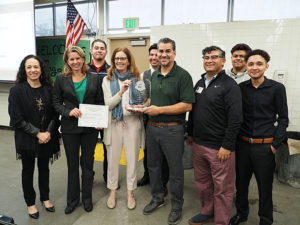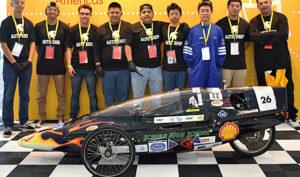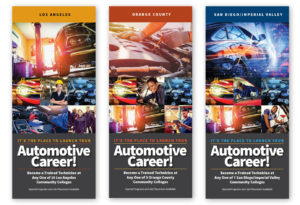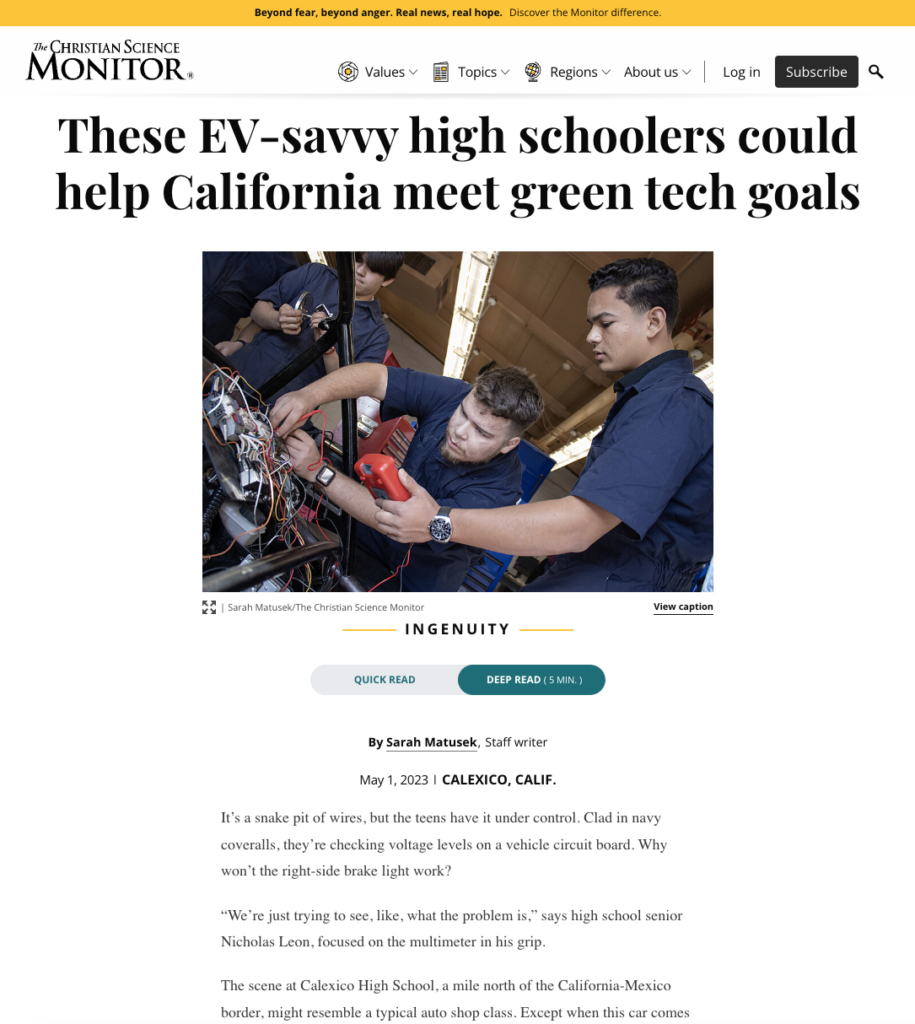 Great article about the CEC’s EV program at Calexico High School in The Christian Science Monitor. Click here or on the image at right.
Great article about the CEC’s EV program at Calexico High School in The Christian Science Monitor. Click here or on the image at right.
















Archive for High School PCOP
These EV-savvy high schoolers could help California meet green tech goals
Students and Teachers Share Impacts of New ZEV Curriculum with Energy Commission
California Energy Commission (CEC) staff recently visited eight high schools to present each with an award for their implementation of zero-emission vehicle (ZEV) curriculum on campus. The schools received funding from the CEC to purchase Switch Electric Vehicle Kits and curriculum to bring awareness of the clean fuels industry to students exploring career options.
“One of the key initiatives we have at the CEC with respect to clean transportation is to introduce and establish zero-emission vehicle programs through high school automotive programs,” said Larry Rillera, staff at the CEC. “One of the visions is not just to provide technologies career pathways into these jobs in clean transportation, but to orient students to the opportunities for a sustainable future.”
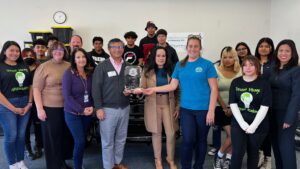
Desert Mirage High School Automotive Program, Thermal, CA
During the visits, students and faculty shared how the ZEV curriculum has made an impact on their campuses.
“We have benefitted from this grant tremendously,” said Jesse Munoz, automotive teacher with North Orange County ROP at Sunny Hills High School. “Our goal is to make a workforce that is comfortable working on electric vehicles. It is something that is constantly changing, it is technology that is evolving, and if we can have students that have some basis in this, it’s going to set them up for a better footing for their futures.”
Students showed the progress they’ve made on building their Switch EVs. Some classes have already completed it, while others are still learning important concepts that can more easily be taught through this hands-on electric vehicle build.
“It’s so hard to teach the students electrical, and this way having them working on a car with wire diagrams, the kids learn so much that I just couldn’t teach them on a bench,” said Christopher Gardner, automotive instructor at Loara High School.
Many students recognize that learning these technical skills while still in high school will prepare them for a future in clean fuels after they graduate.
“This year we are learning how to build high voltage vehicles and how much voltage you need, how they work and what can make them break down,” said a student at Buena Park High School. “This will help us to be prepared in the future when it comes to working outside of high school.”
While learning the foundations of electricity is critical when it comes to working on EVs, many teachers have recognized that by working in groups on the project, students are also developing important life skills.
“Our advanced students are taking advantage and benefiting from learning to build an all-electric car,” said Spencer Mendoza, automotive instructor at Buena Park High School. “They are also learning to organize, one of the skills they will use for life.”
Rillera and Advanced Transportation and Logistics (ATL) staff visited the following schools:
- Katella High School
- Loara High School
- Buena Park High School
- Sunny Hills High School
- Desert Mirage High School
- Montclair High School
- Chaffey High School
- Baldy View ROP at Etiwanda High School
Watch the videos here.
Switch Vehicle Brings Hands-on ZEV Training to San Bernardino High Schools
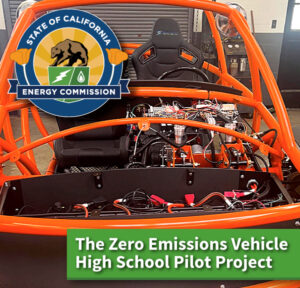
Progress photo of the Chaffey High School Switch EV build.
Transitioning to cleaner vehicles and fuels continues to be a priority in the Inland Empire.
Adding Switch Electric Vehicles to area high school automotive programs has been one way to move this initiative forward and prepare the future workforce for the rapidly-changing automotive job market.
Over the summer, three San Bernardino County high schools brought the Switch EV curriculum to their classes thanks to a grant by the CA Energy Commission through Cerritos College’s ATL program. This electric vehicle kit allows students to engage in every aspect of electrical vehicle theory, construction, maintenance, and operation. In just four weeks, students at Etiwanda High School, Montclair High School and Chaffey High School built this full-size street legal EV as a classroom project. Read More →
California Energy Commission Awards Additional $1.5 Million for Zero Emissions Vehicle High School Pilot Project
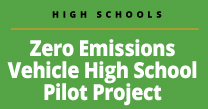 Last fall the Cerritos Community College District’s Advanced Transportation Technology and Energy Center was awarded an additional $1.5 million to recruit additional high schools to participate in the Zero Emissions Vehicle High School Pilot Project funded by the California Energy Commission.
Last fall the Cerritos Community College District’s Advanced Transportation Technology and Energy Center was awarded an additional $1.5 million to recruit additional high schools to participate in the Zero Emissions Vehicle High School Pilot Project funded by the California Energy Commission.
This program is designed to increase career awareness in the clean fuels transportation field for high school students in underserved communities, including regions impacted by poor air quality as well as those serving minority populations.
Each participating high school receives funding to purchase a Switch electric vehicle kit, which comes with curriculum for teachers to use in their classrooms. Teachers also attend a comprehensive train-the-trainer workshop to receive the instruction needed to help their students assemble the vehicle.
At the time of the augmentation, 28 high schools across California had already implemented the program on their campuses, and the project team was excited to reach out to more schools with the invitation. Word of this project had spread throughout the state among auto instructors and CTE coordinators, many of whom reached out to the ATL project team to find out if they could participate.
Over the course of the 2021-2022 school year, interested high school teachers worked with their district administrators to get permission, set up budgets and complete the contracting process which will enable them to offer this new curriculum to their students beginning fall 2022. Thanks to the generous augmentation by the CEC, Cerritos was able to fund an additional 24 schools for the coming school year, bringing the total number of participating high schools to 52.
Pittsburg High School Leads the Way in Autonomous Vehicle Training
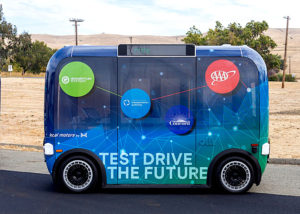
 Thanks to support from the California Energy Commission and the California Community Colleges Strong Workforce Program, Pittsburg High School in the Bay Area is one of the first — if not the first — high school in the state to train students on how to work with and repair fully-autonomous vehicles.
Thanks to support from the California Energy Commission and the California Community Colleges Strong Workforce Program, Pittsburg High School in the Bay Area is one of the first — if not the first — high school in the state to train students on how to work with and repair fully-autonomous vehicles.
The school’s automotive program received two grants totaling more than $640,000 through a partnership with the Contra Costa Transportation Authority (CCTA). Read More →
High Schools Pivot to Remote Auto Instruction During COVID-19
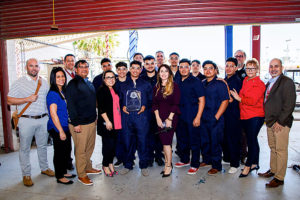
Calexico High School auto students and faculty receive recognition award before campus closures.
 When COVID-19 hit, several high schools that received funding from the California Energy Commission were close to finishing the Switch electric vehicle that they purchased with those funds.
When COVID-19 hit, several high schools that received funding from the California Energy Commission were close to finishing the Switch electric vehicle that they purchased with those funds.
Although students at these schools won’t get to finish the vehicle this year, they are making the best of the remote learning environment.
CEC and ATL representatives visited Calexico High School in February to present them with an award for receiving the Switch vehicle funding. Under the direction of instructor Keith Fisher, students did a presentation about the difference between electric and internal combustion engines and the need to transition to electric vehicles. Read More →
Energy Commission Grant Helps Rowland High School Auto Students See the Future
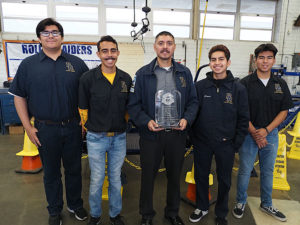
 Rowland High School in Los Angeles County is the latest school to benefit from a Switch Electric Vehicle Kit, thanks to a grant from the California Energy Commission.
Rowland High School in Los Angeles County is the latest school to benefit from a Switch Electric Vehicle Kit, thanks to a grant from the California Energy Commission.
Commissioner Patty Monahan visited the school in December to present a special award plaque and talk with the students about the importance of electric vehicles in California. There are currently 17 electric vehicle manufacturers in the state, all of whom need skilled technicians who can hit the ground running without a lot of additional training.
“We need to make sure there’s a workforce to support the growing electric vehicle market,” Monahan said. “We are happy to be able to support schools learning how to make electric vehicles, and we want you to have a good job when you graduate.”
Energy Commission Grant Fosters Hands-On Learning at Nogales High School
For automotive students, hands-on learning is essential for success in the workplace. Some skills can’t be taught entirely through books alone.
A Switch Electric Vehicle Kit will provide critical hands-on learning opportunities to students at Nogales High School in Los Angeles County, thanks to a California Energy Commission grant.
Commissioner Patty Monahan visited the school in December to present a special award plaque and talk with the students about the importance of electric vehicles in California. She told the students that Tesla’s Model 3 is currently the third best-selling car in California, and the state needs a strong automotive repair workforce to meet consumer demand. Read More →
Industry Partnerships Create Opportunities for Students at Funded High Schools
The automotive industry is changing more quickly than ever, and employers need their new hires to walk into the shop prepared to hit the ground running. Industry partnerships help high schools and community colleges give students the tools they need to do just that.
The result is a win-win for employers, schools, and students. Industry support provides insight into what skills are needed in the workforce and the resources for training that schools might not be able to provide on their own.
High school auto programs funded through the Energy Commission’s Clean Fuels Transportation Pilot Program have a new industry partner in Switch Vehicles, which provides training for high school and community college instructors to build the Switch electric vehicle kits. The training helps faculty understand how to make the best use of the Switch vehicles in their courses, and make sure students got the most out of the experience. Read More →
Schurr High School Represents California in Shell Eco-Marathon Americas
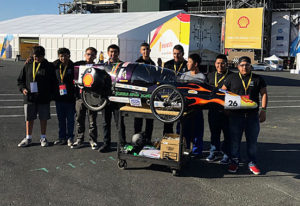
 Schurr High School was one of 88 teams from around the world to compete for the title of Most Fuel Efficient Vehicle at the Shell Eco-Marathon. Each team’s vehicle was required to do eight laps around the Sonoma Raceway track for a total distance of 6.12 miles within 24 minutes.
Schurr High School was one of 88 teams from around the world to compete for the title of Most Fuel Efficient Vehicle at the Shell Eco-Marathon. Each team’s vehicle was required to do eight laps around the Sonoma Raceway track for a total distance of 6.12 miles within 24 minutes.
Under automotive instructor Armando Hernandez’s direction, Schurr High School has participated in the Shell Eco-Marathon since 2008. Their competition vehicle this year was powered by liquid petroleum gas and got 227 miles per gallon in the competition. Read More →
The California Energy Commission’s Clean Transportation Program provides funding to support innovation and accelerate the development and deployment of advanced transportation and fuel technologies.
ZEV High School Pilot Project Final Report Now Available
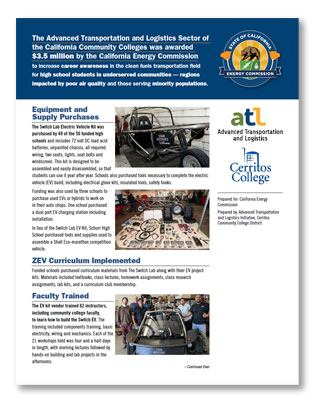
The Zero Emissions Vehicle High School Pilot Project increased career awareness in the clean fuels transportation field for high school students in underserved communities — regions impacted by poor air quality and those serving minority populations.
Project Overview: Click here.
Complete CEC Final Project Report: Click here.
Careers in Automotive and Transportation
Jobs in the automotive and transportation field are numerous. As an automotive student, you can get access to the latest equipment, technology, and automotive designs by taking courses relevant to automotive employment. Community colleges offer courses that are continuously updated on the newest technology to help update your skills. Check out these updated brochures for community college locations where you can become a trained automotive technician! Click here!
Copyright © 2025 All Rights Reserved
WCAG 2.0, ATAG 2.0, ADA, & Section 508 Accessibility by UserWay.
Click on Icon in upper right corner or type CTRL+U.
